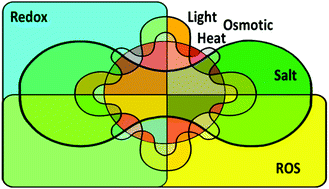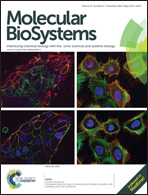Systemic analysis of stress transcriptomics of Synechocystis reveals common stress genes and their universal triggers†
Abstract
Systemic analysis of stress transcriptomes of the cyanobacterium Synechocystis revealed that all stress-induced genes can be separated into two groups: one is clustered around heat-shock- and another – around cold-shock inducible genes. Genes for so-called heat shock proteins (HSPs) are induced by various stressors, e.g. heat, salt, hyperosmotic environment, reactive oxygen species (ROS), changes in light intensity and quality, or in the redox potential of the photosynthetic electron transport chain components. The number of specifically heat-induced genes is rather limited and their functions are mostly unknown. Genes induced by cold overlap with other set of genes induced by all above mentioned stressors with the exception of heat shock. The analysis shows that ROS and redox changes may function as universal triggers for stress responses in cyanobacteria.



 Please wait while we load your content...
Please wait while we load your content...